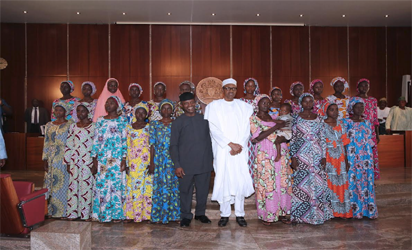Excitement over the release of 21 students of Government Girls’ Secondary School, Chibok by Boko Haram last week was not misplaced given the stress Nigerians have gone through since 270 of the girls were kidnapped in April 2014.
The feat was particularly encouraging as it came when hopes had dimmed on their freedom. Previous negotiations and assurances, even before the inauguration of the President Muhammadu Buhari administration, had not yielded results.
Reports had it that the government had on occasion been fleeced by swindlers who posed as genuine negotiators.
When the surprising result was therefore achieved last week the euphoria across the land was understandable.
Acting on the mood of the moment, a happy Buhari remarked that the girls who had seen the worst of human bestiality in captivity would now experience the best of humanity in freedom.
The impact of that statement is not lost on the freed students and their enthusiastic parents, relations, and well wishers.
Though neither Buhari nor another presidential source disclosed the conditions for the release of the girls, what mattered most was that they had been freed at last.
But while the excitement lasts, there is still a huge question mark on the fate of the remaining girls in captivity.
The government has an obligation in this regard, given the trauma of the parents whose children and wards are still being held. Their feeling of loss needs to be assuaged.
There is also the need to quicken the process, against the backdrop of reports that about one-third of the girls may have died.
This newspaper commends the noble efforts of people and organisations who played various roles in raising the consciousness of the world to the plight of the girls or in facilitating their release particularly the Red Cross.
We salute the courage and sacrifice of members of the armed forces and other security agencies that put their lives on the line to ensure national security.
We note, however, that even with the sudden turn of events, the battle is not yet over. The release of the girls and the uncertain fate of the remaining ones still boil down to insecurity.
This was a major factor that counted against the Goodluck Jonathan administration. Incidentally, while campaigning for the Presidency and even after his inauguration, Buhari had pledged to tackle the menace and ensure the release of the abducted girls.
The government should therefore not rest on its oars on account of last week’s success. It should step up action in ensuring freedom for the remaining students as their stay in captivity remains a blot on the security profile.
There may be nothing wrong in intensifying efforts at partnership with foreign organisations and groups to ensure freedom for the remaining girls.
The government should also match words with action in integrating and rehabilitating those released.
It has been suggested that the girls be sent to school in other parts of the country or abroad to shield them from stigmatisation from neighbours and fellow students.
We are not opposed to any of the options the government eventually adopts. Our concern is that the pledge should not end up like the unfulfilled declarations of previous governments.
As Buhari said, the freed students had experienced the worst form of dehumanisation in the hands of their abductors. They literally passed through the valley of death.
This is the time to expose them to the best that is available. It is the time for them to be shown they have a government that really cares. The matter must not be politicised.
The authorities should also not be carried away by the enthusiasm over the release of the girls. Boko Haram menace is still present and potent.
The attack by the insurgents on soldiers in Yobe last week is an indicator that they are not relenting in their murderous engagement.
There is thus a lot to be done in ensuring that the Boko Haram menace becomes a thing of the past.
Last week’s breakthrough should be seen as the beginning and not the end of the fight against insurgency.
While the search for the remaining students continues, there are other girls and women in various forms of captivity in the country. The saga of the Chibok girls is a metaphor for the plight of the Nigerian girl-child.
We frown at the poor state of inmates at the various internally displaced persons (IDP) camps in the country.
We also criticise the N250 million reportedly spent clearing grasses in one of the camps and the allegation of corruption in others.













